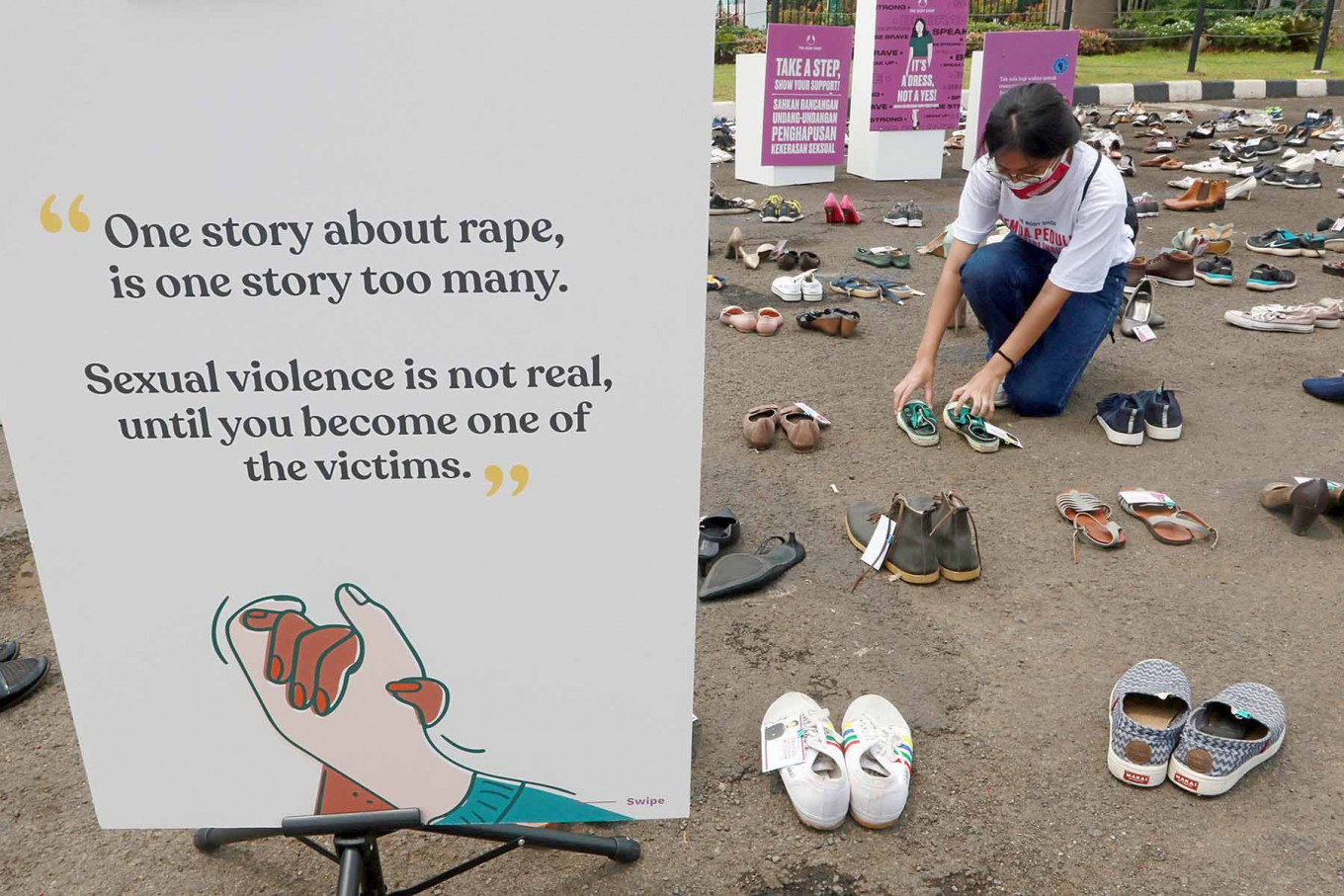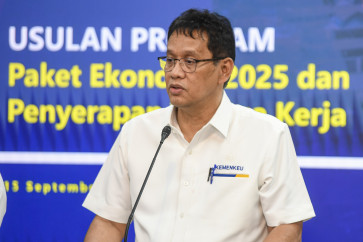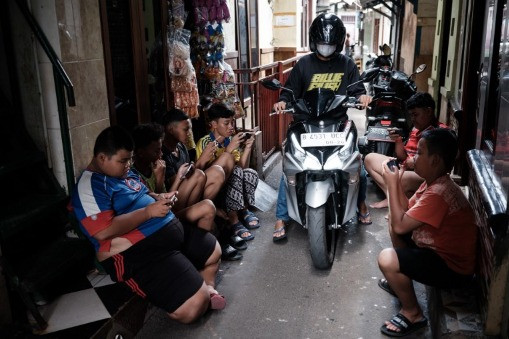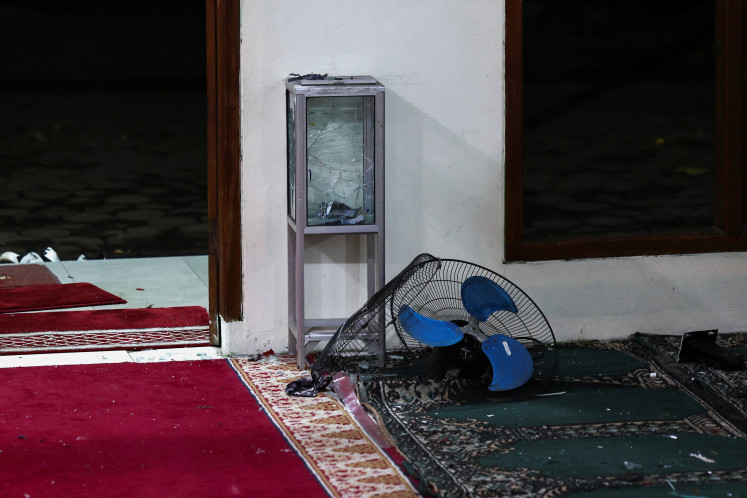Popular Reads
Top Results
Can't find what you're looking for?
View all search resultsPopular Reads
Top Results
Can't find what you're looking for?
View all search resultsConsent vs ‘nikah’: Indonesia’s culture war won’t end anytime soon
An ideological battle is being waged on several fronts, in public over the ministerial regulation on campus sexual violence and at the legislature, which has yet to pass the sexual violence bill, as part of Indonesia's culture war over sexual ethics.
Change text size
Gift Premium Articles
to Anyone
H
alfway into his term as the state official in charge of the nation’s education, Gojek cofounder and Harvard alum Nadiem Makarim has found himself caught in an ideological battle over sexual ethics.
Nadiem, the only millennial and arguably the most “woke” minister in President Joko “Jokowi” Widodo’s Indonesia Onward Cabinet, recently set off a moral panic among conservative Indonesians who fear that the cosmopolitan, American-educated minister is encouraging promiscuity at universities across the country.
The trigger behind this moral panic was a ministerial regulation Nadiem enacted to combat campus sexual violence through provisions that he believed would offer a clear mechanism for resolving allegations of sexual assault in academia.
The regulation has been met with criticism from Muslim groups that have taken issue with the phrase “without consent” as a key element in the definition of sexual assault. Their argument is that this is a foreign and liberal concept and that it is being wielded by the state to “legalize” extramarital sex, at least implicitly, as long as it’s consensual.
To put it another way, having sexual flings on campus is perfectly halal.
Nadiem defended the regulation, stressing that its aim was to eradicate campus sexual assault, which he has lambasted as one of the “great sins” in the education system, and that it neither justified nor endorsed consensual extramarital sex among students.
But his argument has fallen on the deaf ears of conservative, who have chosen to turn the policy into another ideological battle in the long-waged culture war over sexual (mis)behavior in post-authoritarian Indonesia, particularly in the contexts of sexual ethics, sex education and women’s sexual rights.
Post-Soeharto moral politics
It is important to view the controversy over the regulation on campus sexual assault within the frame of this ongoing culture war. It is a war that goes back to the nation’s formative years when the founding fathers were discussing national identity, particularly the role of Islam as the quasi-state religion.
Ideological competition has long informed our politics, embodied conceptually in Sukarno’s “Nasakom” (Nationalism, Religion and Communism) and Soeharto’s “Pancasila democracy”.
The only difference is that, possibly owing to years of depoliticization of Islam under Soeharto, today’s culture war appears to be overly fixated on matters of sex and sexuality. That being said, it is no less political. It’s still all about power, in that any moral panic is often intertwined with, if not driven by, realpolitik.
It is no coincidence that those opposed to the ministerial regulation include opposition groups like the Prosperous Justice Party (PKS) as well as opposition niches within Muhammadiyah and the Indonesian Ulema Council.
Politics of morality is the norm in post-Soeharto Indonesia, starting with the controversy over dangdut singer Inul Daratista’s gyrating dance move known as “drilling”. This was followed by street protests against the Indonesian edition of Playboy and the prosecution of the magazine’s chief editor, the 2008 Pornography Law and the failed petition to the Constitutional Court to amend the Criminal Code by adding zina (extramarital sex) and homosexuality as criminal offenses.
Only a few months ago, Nadiem was the target of harsh criticism from conservative pedagogues for banning faith-based dress codes from public schools, a policy he imposed following reports that several non-Muslim students in West Sumatra had been forced to wear hijabs. School uniforms suddenly became a contested space for competing ideological streams to determine the limits of religious (in)tolerance and (non)freedom in the country.
In fact, the latest controversy over the ministerial regulation on campus sexual assault is just a sideshow. The main show, the battle over the minds and souls of the country, is taking place at the House of Representatives, where lawmakers are (still) deliberating the sexual violence bill.
The bill will have to resolve the key debate over sexual assault and women’s sexuality: Which is more important, consent or nikah (marriage)? This can be interpreted as individual choice vs. social permission regarding any form of sexual activity, regardless of consent.
Consent vs. ‘nikah’
It is not easy to pigeonhole Indonesians in terms of ideology or politics. Some Indonesian liberals consider themselves Muslims first, and even the most puritan and conservative Indonesian Muslim could never represent Indonesia’s moderate Islam, which is far from monolithic. In other words, this culture war is being waged between not only liberal Indonesians and their conservative counterparts, but also the progressive and the retrograde elements within the Muslim community.
The point of contention, however, is anything but ambiguous.
There is no way either of the two opposing sides of this culture war will ever convince the other of their respective positions, because they are simply using different sets of values to determine what constitutes rape or sexual assault. It is safe to say that they are engaging in nothing less than an ideological tug-of-war.
Indonesia has long been starkly divided over the old question of who exactly controls women’s bodies: women, their husbands, their relatives or the state? For some Indonesians, the answer can’t be more obvious: women have control over their own bodies. Thinking otherwise would be an aberration. But for more conservative Indonesians, the very idea of women deciding when and with whom they can have sex is nothing but an affront to their religious and cultural sensibilities.
The former believes that what matters is individual consent, while the latter says that social permission in the form of marriage is the final line. This has led to unreconciled arguments between the two sides over whether consensual extramarital sex is moral or immoral, and whether there is such a thing as marital rape.
While the country still struggles with endemic corruption and socioeconomic inequality stemming from the deeply entrenched oligarchic system, it is likely that this ideological tug-of-war will continue to shape our society and politics in the years to come.
Role of progressive Muslims
It is hard to predict the endgame of this overarching culture war. It is crucial to note, however, that it is being fought on many fronts: at the state level and within civil society, and at legislative and judicial institutions. Moreover, it is a battle fought between not only liberals and conservatives, but also progressive and retrograde elements within the Muslim community, including Muhammadiyah and Nahdlatul Ulama.
It goes without saying that progressive Indonesians who believe that women should have authority over their own bodies and that any type of sexual violence should be abolished, whether they take place within or outside the marital fold, must work together in advocating these values.
But as the largest democracy in the Islamic world, it is even more crucial that progressive Muslims – Muslims who believe that Islam’s universal message is compatible with universal human rights – speak their minds in this ideological battle that often puts women’s rights at stake. It is no exaggeration that the future of Indonesia as a country that respects the rights of every individual, regardless of faith, gender or race, rests in their hands.
***
The writer is editor-at-large at The Jakarta Post and a doctoral student at the Asia Institute, the University of Melbourne.










